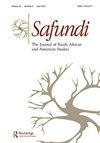文化与行动主义:蒙甘尼·沃利·瑟鲁特的《致每一个生命的血液》
IF 0.2
Q4 AREA STUDIES
Safundi-The Journal of South African and American Studies
Pub Date : 2021-01-02
DOI:10.1080/17533171.2021.1874095
引用次数: 2
摘要
对南非作家蒙加内·沃利·瑟罗特来说,艺术和行动主义只能携手并进。在20世纪70年代和80年代,serte在革命和反种族隔离组织和运动中担任领导角色,在他的写作和这些活动家角色中,他动员其中一个作为实现另一个目标的手段。在他的小说《每一次出生都是鲜血》中,他用叙事的方式尝试了时间和视角,探索了乡镇、流亡和国家的物理空间,以挑战种族隔离政权规范南非人生活的权威。serte运用这种新颖的形式来反对种族隔离政策、社会组织和遗产。通过这部作品,他控诉了该政权侵犯人权的行为,并设想了一个新的世界秩序,由包容性的社区形式塑造,为平等权利而战。本文章由计算机程序翻译,如有差异,请以英文原文为准。
Culture and activism: Mongane Wally Serote’s To Every Birth Its Blood
ABSTRACT For South African author Mongane Wally Serote, art and activism can only operate in tandem. In the 1970s and 1980s, Serote took leadership roles in revolutionary and anti-apartheid organizations and movements, and in his writing and in these activist roles he mobilizes the one as a means to achieve the ends of the other. In his novel To Every Birth Its Blood, he uses narrative to experiment with chronology and perspective, and explore the physical spaces of township, exile, and state in ways that challenge the apartheid regime’s authority to regulate the lives of South Africans. Serote deploys the novel form against apartheid’s policies, social organization, and legacy. Through this work, he indicts the regime for human rights abuses, and imagines a new world order shaped by inclusive forms of community that carry forward the fight for equal rights.
求助全文
通过发布文献求助,成功后即可免费获取论文全文。
去求助
来源期刊
CiteScore
1.00
自引率
0.00%
发文量
0

 求助内容:
求助内容: 应助结果提醒方式:
应助结果提醒方式:


